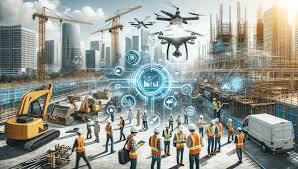Construction projects are getting more intricate prompting project managers and construction experts to utilize AI driven tools for streamlining processes, enhancing efficiency and making decisions based on data.
In this article we will delve into the 5 best AI tools used in the construction industry showcasing how these innovative solutions are revolutionizing project management and optimizing the construction journey from initial planning to successful completion.
The Role of AI in Construction Projects
AI presents benefits in project planning, execution and oversight. Through AI technology construction, specialists can analyze project data to make informed choices, foresee potential challenges in advance and improve resource allocation. As a result, these capabilities significantly boost project management efficiency by enabling scheduling, budgeting accuracy and risk evaluation. Thus, AI powered tools have become essential for navigating the complexities of construction projects – whether they involve renovations or major infrastructure undertakings.
Here is our list of 5 best AI Tools for the construction industry;
OpenSpace is an AI-powered reality capture and analytics platform that is reshaping how construction sites are documented and analyzed. By attaching a 360 degree camera to a hardhat and walking around the site OpenSpace automatically captures a record of the entire project. The platforms computer vision technology aligns the captured images, with project plans to generate a replica of the construction site.
A standout feature of OpenSpace is its ability to function as a “visual time machine.”
Stakeholders involved in the project have the ability to virtually tour any location, on the site during any phase of construction. This allows them to monitor progress, spot issues. Improve communication efficiency. The AI tool features offer insights and data analytics empowering teams to make decisions and enhance overall project effectiveness.
Some key highlights of OpenSpace include;
- Automated site documentation
- Immersive visual records
- BIM Comparison
- Field Notes; Team members can input notes, annotations and issues directly onto captured images to improve collaboration and issue resolution.
2. Procore
Procore stands out as one of the best AI tools for the construction provider connecting all project stakeholders with tailored solutions. The Procore platform aims to boost productivity, efficiency, safety, compliance, financial transparency and accountability for its customers. Specifically designed for the construction sector, Procore offers an array of products for project management, quality control, safety assurance, design coordination, BIM integration, financial operations and field productivity. The platform is flexible ad can seamlessly integrate with accounting systems and third party applications through the Procore App Marketplace.
Key features of Procore include;
- Project management: Procore offers a centralized platform to store documents, track project progress, manage RFIs and submittals, and also facilitate communication between the field and office.
- Quality and safety: It allows teams to manage inspections, observations, incidents, and daily logs to reduce risk and improve quality and safety outcomes.
- Mobile features: Procore’s mobile application allows on site teams to access project details and input data while on the move without an internet connection.
ALICE Technologies stands out as one of Best AI tools for the construction and also one of the pioneering AI driven platform, for construction decision making enabling contractors to enhance their project planning, bidding and execution processes. Established in 2015 with roots, in Stanford University research ALICE (Artificial Intelligence Construction Engineering) utilizes algorithms and AI to produce and assess numerous construction schedule possibilities. Through analyzing 3D models and adhering to guidelines ALICE can pinpoint the project timeline, resource allocation and task sequence to boost productivity and financial gains.
ALICE Technologies key features;
- Smart scheduling: ALICE utilizes AI algorithms to create and assess numerous feasible construction schedules selecting the best approach based on project objectives and limitations.
- Scenario exploration: Users can experiment with scenarios by adjusting project parameters and visualizing the effects on schedule, costs and resource usage in time.
- Seamless BIM integration: ALICE smoothly integrates with Building Information Modeling (BIM) tools allowing for the development of 4D construction simulations and visual project blueprints.
- Efficient resource management: The software optimizes the distribution of labor, equipment and materials, throughout the project to reduce downtime and also enhance productivity.
- Enhanced collaboration and reporting: Also, ALICE promotes collaboration among project participants through shared access version control features and customizable reporting dashboards.
Read also: The Top 3 Benefits of Integrating CNC Routers into Your Construction Workflow
4. Doxel
Doxel stands out as an one of the best AI tool for monitoring construction progress and analyzing data to help teams adhere to timelines and budgets effectively. By leveraging devices like robots and drones equipped with lidar technology and 360 degree cameras Doxel captures visual information of construction sites daily. This data is then processed by Doxels deep learning algorithms to compare project status against the BIM model and schedule, for detecting discrepancies or potential challenges.
Doxel’s main features include;
- Automated progress tracking: Utilizing devices and AI technology Doxel captures and analyzes site data daily to offer an current overview of construction progress.
- BIM based analysis: By comparing site conditions, with the BIM model the platform identifies discrepancies and potential issues throughout than 80 construction phases.
- Predictive insights: Doxel offers forecasts on project completion timelines highlights delays and also warns about budget overruns empowering teams to proactively manage risks.
- Productivity measurements: The platform monitors metrics such, as production rates and also labor efficiency to assist teams in optimizing resource allocation and enhancing productivity.
- Integration and teamwork: Furthermore, Doxel seamlessly integrates with existing construction management tools providing a hub for project stakeholders to access data, exchange insights and collaborate effectively.
5. Buildots
Buildots is a construction management platform powered by AI that enables contractors to enhance efficiency and minimize delays, in construction projects. By utilizing computer vision technology and 360 degree cameras attached to hardhats Buildots records data of construction sites every day. The company’s unique AI algorithms then analyze this data comparing the progress with the Building Information Modeling (BIM) model and project schedule to detect discrepancies and potential issues in time.
Some key features of Buildots include;
- Automated progress tracking
- BIM integration
- Predictive analytics
- Productivity insights
The Future of Construction industry
In this article we’ve delved into the 5 best AI tools for the construction that are retransforming the construction sector by offering efficiency, precision and understanding. By adopting these technologies construction experts can greatly enhance project results, mitigate risks and also remain competitive in the industry. Additionally, as AI advances further we anticipate the emergence of groundbreaking solutions that will reshape how we plan for and oversee construction projects.
What are the best AI tools for construction project management?
Leading AI tools for construction project management include OpenSpace, Procore ALICE Technologies, Doxel and Buildots. These tools bolster project management, by facilitating data driven decision making and real time progress monitoring.
The influence of AI tools on construction sites is particularly remarkable. Sophisticated AI algorithms can interpret data from sources such as sensors, drones and wearable tech to offer real time insights into project advancements and site conditions. This continuous flow of information empowers project managers to swiftly make data oriented decisions that address issues promptly. Ensure projects stay on course.
Moreover; enhanced safety systems, with AI capabilities can detect risks monitor employee actions and recommend actions leading to a significant enhancement in on site safety and a decrease in accidents.
Consequently, apart from improving efficiencies, these AI tools are revolutionizing the construction process starting from initial design to final inspection. In the design phase AI can help create optimized designs that take into account factors like energy efficiency, material usage and environmental impact. In the construction phase AI driven robotics and automation are simplifying labor tasks boosting productivity and ensuring quality. Meanwhile, after construction completion AI continues to be pivotal in building management and maintenance by predicting repair needs and optimizing energy consumption.
Read also: Partnering with the Right Structural BIM Provider for Construction Projects

